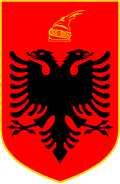 |
|---|
This is a list of mayors of Tirana who have served since the Albanian Declaration of Independence of 1912. [1]
 |
|---|
This is a list of mayors of Tirana who have served since the Albanian Declaration of Independence of 1912. [1]
| No. | Name | Start | End |
|---|---|---|---|
| 1 | Zyber Hallulli | 1913 | 1914 |
| 2 | Servet Libohova | 1915 | 1916 |
| 3 | Ismail Ndroqi | 1917 | 1922 |
| 4 | Ali Begeja | 1922 | 1923 |
| 5 | Ali Derhemi | 1923 | 1924 |
| 6 | Beqir Rusi | 1924 | 1924 |
| 7 | Xhemal Kondi | 1924 | 1925 |
| 8 | Fuad Toptani | 1925 | 1927 |
| 9 | Izet Dibra | 1927 | 1928 |
| 10 | Rasim Kallakulla | 1928 | 1930 |
| 11 | Rexhep Jella | 1930 | 1933 |
| 12 | Abedin Nepravishta | 1933 | 1935 |
| 13 | Qemal Butka | 1935 | 1936 |
| 14 | Abedin Nepravishta | 1937 | 1939 |
| 15 | Qazim Mulleti | 1939 | 1940 |
| 16 | Ali Erëbara | 1940 | 1942 |
| 17 | Omer Fortuzi | 1942 | 1943 |
| 18 | Halil Meniku | 1943 | 1944 |
| 19 | Llazar Treska | 1944 | 1945 |
| 20 | Ali Bakiu | 1945 | 1947 |
| 21 | Ibrahim Sina | 1947 | 1949 |
| 22 | Isuf Keçi | 1950 | 1951 |
| 23 | Sabri Pilkati | 1951 | 1951 |
| 24 | Peço Kagjini | 1951 | 1952 |
| 25 | Sami Gjebero | 1953 | 1954 |
| 26 | Ibrahim Sina | 1954 | 1955 |
| 27 | Sami Gjebero | 1956 | 1957 |
| 28 | Rifat Dedja | 1958 | 1960 |
| 29 | Rexhep Guma | 1960 | 1961 |
| 30 | Sabri Pilkati | 1961 | 1962 |
| 31 | Rifat Dedja | 1962 | 1964 |
| 32 | Sabri Pilkati | 1965 | 1966 |
| 33 | Abdyl Këllezi | 1967 | 1969 |
| 34 | Myqerem Fuga | 1970 | 1973 |
| 35 | Ndue Marashi | 1974 | 1975 |
| 36 | Nesip Ibrahimi | 1976 | 1983 |
| 37 | Pjetër Kosta | 1983 | 1984 |
| 38 | Jashar Menzelxhiu | 1984 | 1985 |
| 39 | Llambi Gegprifti | 1986 | 1987 |
| 40 | Leandro Zoto | 1987 | 1989 |
| 41 | Llambi Gegprifti | 1989 | 1990 |
| 42 | Tomor Malasi | 1991 | 1992 |
| 43 | Sali Kelmendi | 1992 | 1996 |
| 44 | Albert Brojka | 1996 | 2000 |
| 45 | Edi Rama | 2000 | 2011 |
| 46 | Lulzim Basha | 2011 | 2015 |
| 47 | Erion Veliaj (suspended) | 2015 | 2025 |
| 48 | Anuela Ristani (acting) | 2025 | Incumbent |